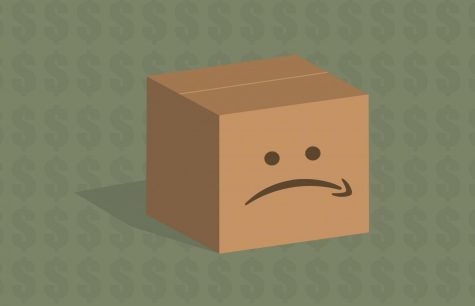Amazon needs accountability during pandemic
Seattle tech industry giant highlights wealth gap during COVID-19 pandemic
May 21, 2020

Now, more than ever, is the time for the City of Seattle to tax Amazon and Jeff Bezos
The United States is experiencing economic turmoil that can only be described as “unprecedented.”
Such narratives paint reality as if we are facing a hopeless economic loss. There is, however, a $142.1 billion — and vastly growing — fortune accumulating right under the Emerald City’s nose.
The U.S. is currently seeing its highest unemployment rates since The Great Depression, as well as hundreds of thousands of families experiencing food insecurity due to job loss or impeding health concerns. Many city councils across the country are expecting extreme revenue cuts to last through the end of the year and predict the forced furlough of employees across departments.
Kent, Washington’s sixth largest city, is experiencing what King 5 News characterizes as “financial freefall.” Because of the extreme loss in the business taxes the city depends on, Mayor Dana Ralph predicts “deep and widespread” budget cuts and has already called for an immediate halt on certain services, including construction and maintenance which provides jobs for many.
The economic consequences of state-enforced COVID-19 shutdowns are primarily derived from the closure of locally-owned businesses deemed non-essential and restaurants which cannot afford to survive such a halt in traffic. This further devastates local workers, along with their cities and local economies. Many experts predict such veracious damage is not only far from its peak, but is also being heavily under-documented.
While discussing Seattle’s expected $210 million to $300 million loss in tax revenue, Seattle Mayor Jenny Durkan warned that, “this probably will be the toughest economic climate our city has faced in multiple generations.”
Kat Thorne, a 2019 Seattle Pacific University graduate, lost their job at the North Seattle’s Academy for Precision Learning March 14 when Gov. Inslee called for the closure of all Washington schools. Thorne has been surviving off of their savings since, waiting anxiously for in-person classes to resume.
Jeff Bezos, in addition to being the founder, CEO and president of online retailer Amazon, is the world’s richest man. Business Insider calculated Bezos makes about $2,489 per second from his company stock ownership, more money than the average minimum wage worker in the United States makes in two weeks and has a net worth greater than the combined GDP of Iceland, Costa Rica and Afghanistan.
Despite his wealth, Bezos notoriously and frequently slims his offered employee benefits and rids of insurgents at not only Amazon, but at other ownership Whole Foods.
According to Business Insider, just last September, Bezos cut health care coverage for all of his 1,900 part-time Whole Foods employees and, last month, he overlooked the firing of Staten Island Amazon warehouse worker Christian Smalls after he organized a protest bringing awareness to working conditions leaving him and his coworkers susceptible to coronavirus at their New York City workplace. Since Small’s firing, Amazon Vice President Tim Bray has left his position with the company, characterizing the choice to fire Smalls and other “whistleblowers” as “chickenshit.”
Not only does Bezos very clearly exploit his workers, but he has twisted the entrepreneurial spirit of Amazon’s birthplace by using his wealth to take advantage of his employees and fellow Seattlites alike. It’s clear that Bezos can’t be trusted to invest in the city he lives in, much less in the lives of his employees.
Once-modest neighborhoods have seen astronomical rent surges and destruction of affordable spaces, pushing working class people — many of whom are people of color — out and upper and middle-class tech employees in. Between 2017 and 2018 alone, Seattle saw a 28% increase of people experiencing chronic homelessness and, despite being the country’s 18th largest city, it hosts the third largest population of people experiencing homelessness.
The correlation between Bezos’s wealth and the extreme scarcity many Seattleites experience is clearly evident, trailing Seattle City Council member Kshama Sawant’s 2020 “Tax Amazon” campaign which introduced it’s legislation to the City Council on April 3. The proposed legislation pushes for a 2% tax on Amazon and Seattle’s major corporations and, if passed, it will go toward building affordable housing, funding Seattle’s Green New Deal and providing families affected by the pandemic with emergency cash assistance. A summary of the legislation can be found at Sawant’s Seattle City Council member page.
Although Amazon made over $11 billion in 2018, this is nothing compared to the $141 billion Bezos is continuously accumulating.
No one makes or should make $141 billion dollars. I argue no one should even make $1 billion.
Money of that proportion always derives from exploitation, and during this time of universal need, it is time to call for the proper redistribution of such magnitude. We cannot expect Bezos, or any billionaire, to donate responsibly. It is time for our local government to step in and reallocate such funds for us.

























































































